LATEST NEWS


Two weeks out from the presidential election, you may not have the epic battle between L.A.’s Chinatown community and Walmart foremost in mind. But this high-stakes conflict is nothing if not riveting, with all the twists and turns of a modern-day Chandler novel.
If you haven’t been paying attention the last few months, here’s a quick cheat sheet: In February Frying Pan News broke the story that Walmart was planning to open its first-ever Los Angeles grocery store in historic Chinatown. The prospect of the world’s largest retailer setting up shop in a neighborhood famous for its homegrown stores and restaurants prompted residents, business owners and activists to seek a temporary ban on chain stores in the area. Just as the City Council was poised to pass the ban, Walmart mysteriously – some would say suspiciously, in the wake of the corporation’s stunning Mexican bribing scandal – secured building permits for its Chinatown location the night before the Council vote.
» Read more about: Walmart vs. Chinatown: The Suspense Builds »


Big Food companies and their lobbying groups have lied to us many times. They convinced Congress to include tomato paste on pizzas as a vegetable. They say we need industrial, chemical-laden agriculture to feed the world. (Check out Anna Lappé’s new video Food MythBusters to learn that we don’t.) And Big Food has also spread the mythology that if the minimum wage is raised, food will become so expensive that none of us will be able to afford to eat out – or eat at all – again.
Yes, that’s a lie! On this Food Day 2012, our organizations are releasing a new report, A Dime a Day: The Impact of the Miller/Harkin Minimum Wage Proposal on the Price of Food. The proposed Fair Minimum Wage Act, introduced this year by Representative George Miller (D-CA) in the House and Senator Tom Harkin (D-IA) in the Senate would raise the federal minimum wage from $7.25 to $9.80 per hour over the next three years and the tipped minimum wage from $2.13 to 70 percent of the regular minimum wage.
» Read more about: What Can You Get for a Dime a Day? A Lot, Actually »


Fifteen people have died and several hundred have been infected in an outbreak of meningitis contracted from contaminated spinal steroid injections. The numbers are growing and so is awareness of the growth of a little known corner of the pharmaceutical industry, called compounding pharmacies, which is responsible for the tragedy. “We’re nowhere near the end of this problem,” Dr. William Schaffner, an infectious diseases expert at the Vanderbilt University Medical Center in Nashville, told CBS This Morning.
The compounding pharmacies originally were supposed to provide customized medication for individual patients but have morphed into bulk manufacturers outside of FDA’s regulatory reach.
At the heart of the tragedy is the compounders’ successful track record blocking FDA authority that could have averted the disaster. Their efforts are a textbook model of industry opposition to new rules that could save lives. Their arguments are the same that the Chamber of Commerce and industry are using today to block clean air,
» Read more about: Meningitis Outbreak: Unregulated Labs' Disgraceful Legacy »


I wrote this post for The Stansbury Forum, a site honoring the work and spirit of union activist, writer, friend and mentor Jeff Stansbury, who died in 2008.
Five years in Los Angeles and I was still suffering from the region’s alienating social atmosphere. I had a few good friends, a new relationship and some interesting work under my belt in sales, journalism and PR. But I couldn’t shake the sensation that people in L.A. keep their distance and that there was something innately “asocial” about this place.
As I’ve explained, the labor movement was the tonic for my personal crisis. Southern California’s sprawl, materialism and hyper-individualism became less of a preoccupation when I started working with unions. I was finally giving up my fantasy of heading back to Vermont and could concentrate my mind on universal themes: big stuff like ethnic and class roots,
» Read more about: Making History: Remembering Jeff Stansbury »

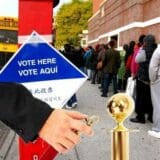
During much of this, my second year of retirement, I have been reading the three volumes of Taylor Branch’s history of America during the years of Martin Luther King, Jr. and the struggle for civil rights. Those rights hinged on the capacity of African Americans to vote, which state governments across the Deep South, especially, had precluded through a combination of laws and social conventions, reinforced by white-on-black violence. Here is the author’s first paragraph of the preface to his concluding volume in the trilogy:
“Nonviolence is an orphan among democratic ideas. It has nearly vanished from public discourse even though the most basic element of free government – the vote – has no other meaning. Every ballot is a piece of nonviolence, signifying hard-won consent to raise politics above firepower and bloody conquest. Such compacts work more or less securely in different lands. Nations gain strength from vote-based institutions in commerce and civil society,
» Read more about: A Vote of Confidence: Why We Must Safeguard the Ballot »


If you skipped down below, you saw that Joann is the Executive Director of the Food Chain Workers Alliance, a national coalition of workers’ organizations, and Jill is Director of Business and Culinary Development of Coosemans Shipping of L.A., a specialty produce distribution company. So, you may be wondering – what are these two doing writing a blog post together?
We are co-chairs of the Good Food Procurement working group of the Los Angeles Food Policy Council, an initiative of Mayor Antonio Villaraigosa. Over the past year and a half, our diverse group – including labor organizations, businesses, non-profit groups, school food service officials, public health advocates, and many more – has developed the Good Food Purchasing Pledge. And the L.A. City Council is poised to adopt the pledge via the Good Food Purchasing and Procurement Motion, sponsored by Councilmember Paul Koretz,
» Read more about: L.A. Is Leading the Good Food Movement! »


In October of 2011, Governor Jerry Brown signed into law the California Dream Act—which allows undocumented but high-achieving immigrant students to receive state funds to help pay for college. It was a monumental victory for tolerance and the culmination of a long fight—Arnold Schwarzenegger repeatedly vetoed similar measures during his tenure in the California governor’s office.
Come November 6, however, that fight could begin all over again if California’s Proposition 32 passes. The initiative will outlaw the use of automatic payroll deductions from union members and corporations for political purposes, crippling union political activity and empowering the measure’s billionaire backers to impose their political will on the state. While state unions passionately fought for the California Dream Act’s passage, they were opposed by politicians with ties to Prop. 32’s backers. Though they might not be rabid with anti-immigrant bile, Prop. 32’s moneymen have no problem funneling money to politicians who are.
» Read more about: Borderline Crazy: Prop. 32's Anti-Immigrant Allies »
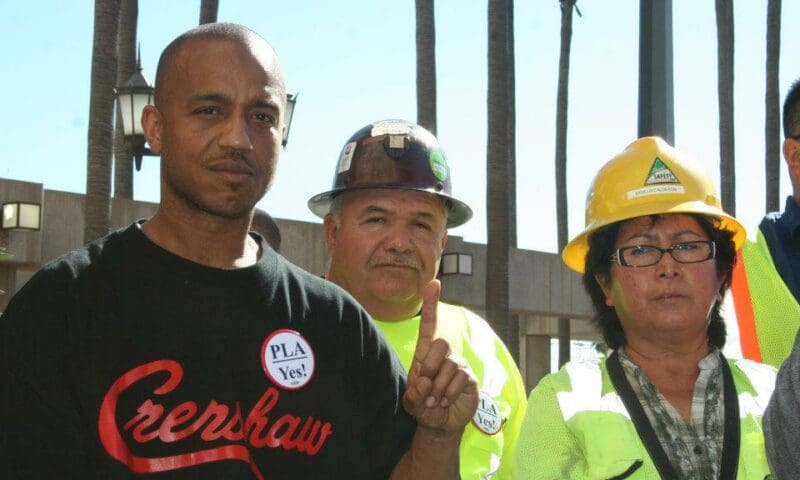

The U.S. Census reported in September that San Francisco and San Jose are the richest cities in the nation and that the poverty rate in California increased for the fifth year in a row, to 16 percent of the population. The Great Recession has been brutal for working people and clearly we aren’t out of the woods yet.
We need jobs. Good jobs. Here. Now. A lot of people in Los Angeles have been working on making that happen, especially around transit, and the efforts are starting to pay off. First, L.A. County voters approved the Measure R half-cent sales tax in 2008 that raises $40 billion for transportation – here, in L.A. County – over 30 years. Then, the Los Angeles Alliance for a New Economy (LAANE) and the L.A.-Orange Counties Building & Construction Trades Council convinced L.A. Metro to take the extra steps to make sure Measure R jobs are good jobs.
» Read more about: Good Jobs Here, Now — When & Where We Need Them Most »
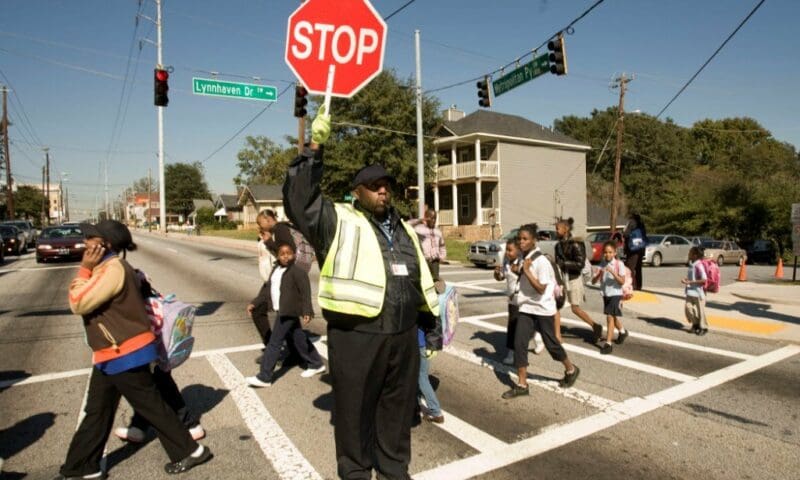
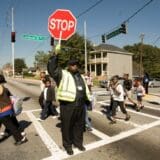
The next time a politician calls on the state or federal government to trim its workforce – right after promising to “grow jobs” – it might be good for him to remember that one in five working Americans is a public employee. Not only does thinning the public sector reduce the number of services and quality of life enjoyed by taxpayers, it also throws more people onto the unemployment rolls.
Those who see themselves as swashbuckling entrepeneurs or disciples of Ayn Rand do have an alternative to public sector employment in mind – the privatization of work that has historically been performed by government.
In the Public Interest, a nonprofit that researches the dynamics of privatization and government contracting, has just released a study showing in sharp relief the dangers that come with such an alternative. This backgrounder brief is titled, rather unambiguously, “Six Reasons Why Government Contracting Can Negatively Impact Quality Jobs and Why it Matters for Everyone.”
» Read more about: New Study: Keep Public Service Jobs Public »


In 1894, in Le Lys Rouge, Anatole France wrote, “The law, in its majestic equality, forbids the rich and the poor alike to sleep under bridges, to beg in the streets and to steal bread.”
Over time, this phrase, (probably along with “Let them eat cake”), has become the enduring expression of those things that sound like equality but, in ignoring differences in station, circumstance or means, become absurd, because, in reality, they would only be applied to one of the two groups allegedly being treated in equal fashion.
Such is the case with Prop. 32. This proposition would bar contributions of funds for “political purposes” (further defined below) only if those funds were collected through payroll deductions. The measure is crafted to look as though it is limiting the ability of both unions and corporations to make campaign contributions to candidates or measures, but, in truth,
» Read more about: The Fundamentals of a Fraud: Proposition 32 Explained »


Any lawyer with some experience in Sacramento politics can draft language for a statewide initiative. But crafting deceptive ballot measures that can trick people into voting against their core beliefs is nothing less than an art form.
For many years, the undisputed master of the misleading initiative has been Thomas Hiltachk. So it’s little surprise that Hiltachk is the author of Proposition 32, which promises to rid Sacramento of special interest money – but which would actually give almost complete control of state politics to corporations and the super-rich by effectively crippling the ability of unions to participate in elections and lobbying. Hiltachk has also quite possibly written into the initiative a poison pill that would shield corporations from its provisions and leave only unions to suffer the consequences if Prop. 32 passes.
A full-time political and election lawyer since 1998, Hiltachk is an old hand at drafting legislation benefiting Big Tobacco or beating back living wage campaigns.
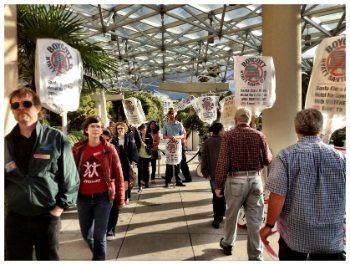

On October 12, 2012, 70 women and community members from across Silicon Valley spoke out against Hyatt’s disrespect of women and their bodies in a protest at the Hyatt Regency Santa Clara. The action, which marks the one year anniversary of Hyatt’s firing of Martha and Lorena Reyes, featured a “Women’s Solidarity Quilt” bearing messages of support for the two sisters and stories of the struggles women face at work. Quilts, a traditionally female art form, have long represented women’s role as the social backbone of our communities and their solidarity for one another.
On November 18, 2011, Martha and Lorena Reyes each filed a retaliation charge against the Hyatt Regency Santa Clara with the federal agency, Equal Employment Opportunity Commission (“EEOC”). Their cases are still under investigation at the EEOC. The housekeepers were among many Hyatt employees whose faces were pasted atop bikini-clad images on the company’s bulletin board.
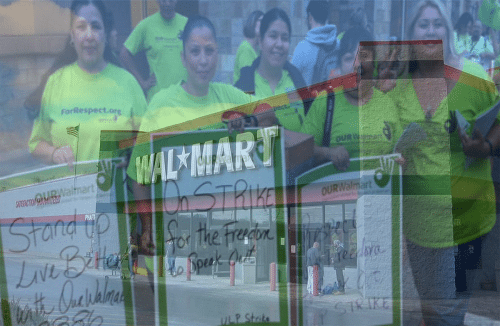

Just three days after the first Walmart employee strike in history, Walmart issued an internal memo entitled Response to Walkout/Work Stoppage that surprisingly cautions against any but the most gentle treatment toward strikers. The document, meant for the eyes of salaried employees only and dated October 8, was leaked by the Huffington Post yesterday.
The strikes began at the Pico Rivera store in California on October 5 and had spread to 28 stores by October 9. The internal memo sets forth a new policy of non-interference and adherence to the National Labor Relations Act, affirming the right of employees to strike. It specifically states:
Do not discipline associates for walking off the job… (Emphasis in original document).
Dan Schlademan, Director of Making Change at Walmart, spoke to the Huffington Post on the unusual document: “I’ve been doing this work for 20 years,
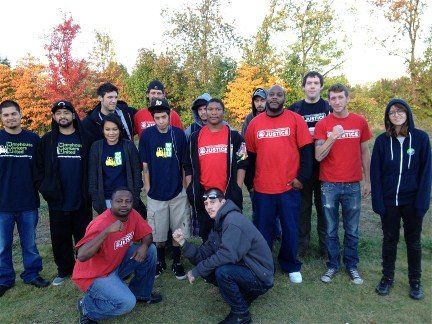

Following national strikes at Walmart stores and at warehouses in Southern California and Illinois, workers who move Walmart merchandise at those sites have just arrived in Arkansas to call for an end to a new wave of retaliation against employees at Walmart-controlled warehouses. The dozen-plus warehouse workers have come to Bentonville during Walmart’s annual “Stakeholder Summit.”
They plan to draw a stark contrast between the image Walmart projects and the reality that hundreds of thousands of U.S. workers throughout its supply chain face intense retaliation whenever they speak out about poor working conditions.
The workers will hold a media conference later this morning, after which they will deliver a petition signed by more than 150,000 people nationally to Walmart’s home office.
“Walmart cannot have it both ways,” said Guadalupe Palma, a director for Warehouse Workers United, a group committed to improving warehousing jobs.
» Read more about: California Walmart Warehouse Workers Reach Bentonville »


(The following feature from the American Prospect is reposted with permission. Although it mostly focuses on Propositions 30 and 38, it also examines the leading financial backer of Proposition 32, which Frying Pan News is following in a special series of investigative pieces.)
America has the Koch brothers, and now California has the Munger kids. Unlike the right-wing Kochs, Molly Munger and her brother Charles Jr. entered politics from opposite directions—she’s a liberal Democrat and a champion of inner-city schools; he’s an economic conservative, a social moderate, and a Republican activist. But thanks to the vicissitudes of California politics and the self-absorption that wealth can bring (their father is Charles Munger, a Pasadena attorney and investor who is the longtime vice-chairman of Warren Buffett’s Berkshire Hathaway investment consortium), they’ve come together in the past couple of days to attack the most important measure on the California ballot: Governor Jerry Brown’s initiative to raise taxes on the rich so that the state’s schools and colleges won’t take a massive fiscal hit immediately following the election.
» Read more about: Charles Munger Jr.: Remaking California in His Own Image »


When a man makes millions a year and pays a paltry tax of 13 percent and then demonizes people too poor or too old to pay any, who’s the “moocher?” Well, that’s easy, but besides the really rich, those of us who are in the middle class also get lots of breaks. The federal tax code offers tax deductions that support our comfort, while the budget delivers subsidies that underwrite the way we live. Some of these are obvious, some obscure and some buried so deep we don’t bother to count them.
Let’s start at home. Homeowners receive the “home mortgage interest deduction,” which costs the federal treasury $84 billion a year. That’s at least twice as much as the federal government spends on affordable housing for the poor and working poor. But that’s just the surface. As a working minister, although I received a relatively low salary,
» Read more about: Middle Class Tax Breaks: An Invisible Lifeline? »


It seems that many members of the newest generation of fiction writers have difficulty creating political works that are accessible and appeal to a wide audience. Author J.L. Morin, however, has overcome these obstacles with her novel Trading Dreams, a compelling mystery that is also a story of personal discovery – as well as an in-depth analysis of the Occupy Wall Street movement and the factors that have created our economic kerfuffle. As I interviewed this amazing woman, her answers shed even further light on the extensive thought that went into crafting this story.
Frying Pan News: An interesting aspect of this book was the murderer storyline coexists with the plot dealing with the corruption on Wall Street. What caused you to write a story that was both a mystery and a political statement?
J.L. Morin: Growing up in Detroit when it was the murder capital of the U.S.


I never had any intention of purchasing Arnold Schwarzenegger’s pathetic new biography, so it would be disingenuous to say that I am “boycotting” the book.
The truth is, few people of conscience — who certainly abhor Schwarzenegger as both a person and a politician — are likely to buy the book. But to register my protest against his behavior toward his wife, his children, women in general and the people of California, I’ve donated the price of the book — $35.00 – to the Feminist Majority Foundation. and to the National Domestic Workers Alliance. Where these websites ask “donation in honor of,” I wrote, “Opposition to Arnold Schwarzenegger.” I encourage others to join me in this protest.
Schwarzenegger has a long history of abuse toward women. The most recent outrage is his reluctant acknowledgement of having fathered a child with his family’s housekeeper, with whom he had a covert affair,
» Read more about: Total Recoil: Why I'm Boycotting Schwarzenegger's Book »


As we all know, Prop. 32 is the third incarnation of earlier failed measures to silence working families.
Charles Munger Jr. and wealthy investors have poured millions into the deception – uh, proposition – but California working families are saying “Boo to 32,” with a little help from a few zombies.
The idea behind the video, now showing on computer screens everywhere, is that the zombie measure keeps getting resurrected, and we need to bury it, once and for all, Nov. 6.
SEIU Local 521 issued a casting call within our rank and file, and Zombie-wannabes emerged everywhere. One member turned out to be a professional make-up artist and helped zombie-fy others for the shoot. (She’s the zombie in the red dress.
Brian O’Neill, Santa Clara County Property Appraiser, aka Mr. One Percent:
“I had a great time filming Boo on 32.
» Read more about: Prop. 32: A Zombie Measure Returns from the Dead »


Brothers David and Charles Koch, and other libertarian billionaire backers of Proposition 32, including Charles Munger Jr., like to wrap themselves in the toga of individual freedom. However, despite their supposed ideological fervor for personal liberties, they have allied themselves with some of the nation’s most vociferously anti-gay religious activists – all for a campaign to outlaw the use of automatic payroll deductions from union members and corporations for political purposes. Although it is not widely seen as a “gay issue,” Prop. 32’s passage could have far-reaching consequences for California’s gays and lesbians.
“If we lose organized labor as a funded political ally in California, the LGBT movement is in big trouble,” says Courage Campaign founder and LGBT activist Rick Jacobs. “Would you rather have Howard Ahmanson thinking about your rights in the workplace, or organized labor? That’s what this is about. Mark my words, people like the Kochs and Ahmanson are not thinking about how LGBT people are welcome in the workplace and not discriminated against.”
Howard Ahmanson,